-
Passion, curiosity and perseverance: my mission to capture women in science on camera
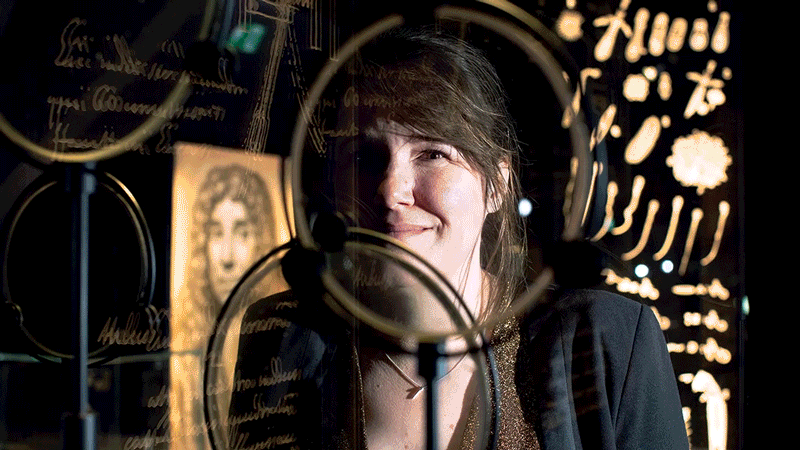
Some of the people featured in Elisabetta Citterio’s photographic project STEM Passion, which opens this month at the Berlin Institute of Health.Credit: Elisabetta Citterio In 2019, molecular biologist Elisabetta Citterio embarked on a journey to highlight the achievements of women in science, technology, engineering and mathematics (STEM), and to broaden public interest in their research…
-
In the AI science boom, beware: your results are only as good as your data
Hunter Moseley says that good reproducibility practices are essential to fully harness the potential of big data.Credit: Hunter N.B. Moseley We are in the middle of a data-driven science boom. Huge, complex data sets, often with large numbers of individually measured and annotated ‘features’, are fodder for voracious artificial intelligence (AI) and machine-learning systems, with…
-
Mysterious exploding star and more — January’s best science images

Dry January. The Kashmir Valley is a popular winter tourist destination owing to its mountains and ski resorts — such as Gulmarg, pictured here, where the hills are normally snow-covered in January. But the valley has been afflicted by an exceptional drought, with no snow and an almost 80% shortfall in rain between December 2023…
-
From a pocketful of rocks to scientific director of palaeontological research
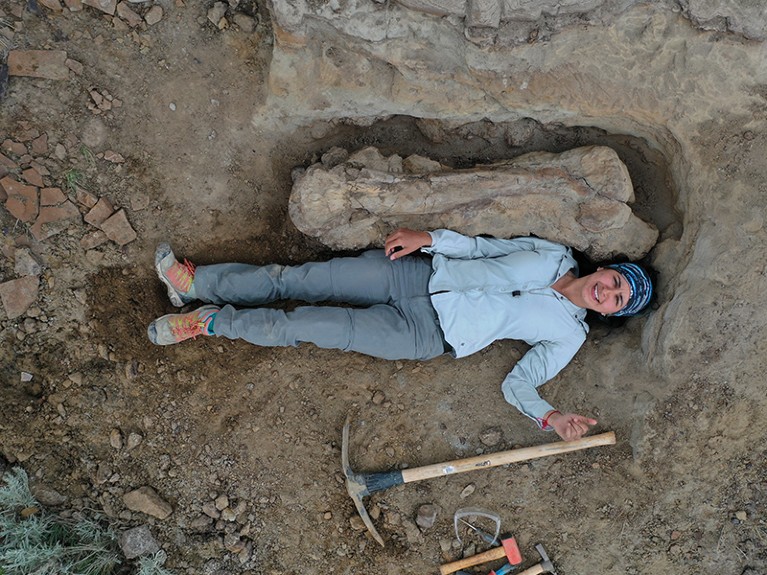
PhD candidate Dirley Cortés lies next to a therapod dinosaur’s long bone during a field course at the Dinosaur Provincial Park near Brooks, Canada.Credit: Hans Larsson/McGill University, Canada Born and raised in Villa de Leyva, Colombia, Dirley Cortés used to come home from family walks with her pockets full of rocks from the fossil-rich area…
-
How can scientists make the most of the public’s trust in them?

Innovations such as remotely operated robotic surgery are coming, but people have concerns about governments’ competence to regulate new technologies.Credit: CFOTO/Future Publishing/Getty People around the world have high levels of trust in scientists, but are concerned about governments interfering in research. These are among the findings reported by the global communications giant Edelman in its…
-
How cancer hijacks the nervous system to grow and spread
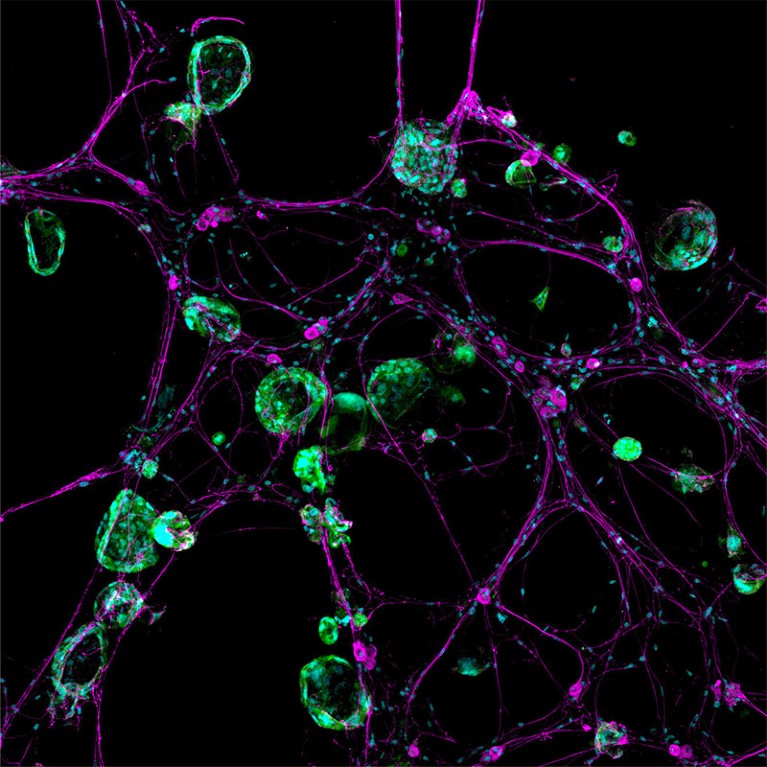
A 3D model system shows how nerve cells (magenta) interact with cancer cells (green).Credit: Jennifer Su, Peter Wang, Nicole Lester, William L. Hwang Lightning bolts of lime green flashed chaotically across the computer screen, a sight that stunned cancer neuroscientist Humsa Venkatesh. It was late 2017, and she was watching a storm of electrical activity…
-
Large-scale citizen science reveals predictors of sensorimotor adaptation
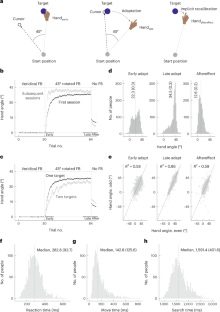
Abstract Sensorimotor adaptation is essential for keeping our movements well calibrated in response to changes in the body and environment. For over a century, researchers have studied sensorimotor adaptation in laboratory settings that typically involve small sample sizes. While this approach has proved useful for characterizing different learning processes, laboratory studies are not well suited…
-
The Insiders’ Guide to Science and Nature Filmmaking – Workshop in Winnipeg
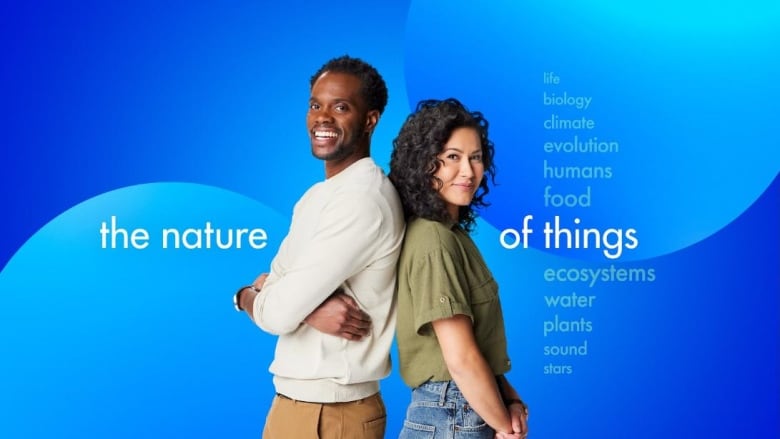
(CBC) The Nature of Things is offering a one-day workshop and networking opportunity for up to 15 selected documentary filmmakers or production crew from the Indigenous, Black, racialized, 2SLGBTQ+, and/or Deaf and Disabled communities based in Manitoba. The goal of this in-person workshop is to introduce participants to key decision-makers and insider information about science…
-
Explore the Museum
Receive email updates about our news, science, exhibitions, events, products, services and fundraising activities. We may occasionally include third-party content from our corporate partners and other museums. We will not share your personal details with these third parties. You must be over the age of 13. Privacy notice.
-
Who needs qubits? Physicists make light-based ‘qumodes’ for quantum computing

Quantum computers are built from qubits: physical objects with properties that have one of two possible results when measured. The prototypical example is an electron, whose spin will always show as either clockwise or counterclockwise. Access options /* style specs start */ style{display:none!important}.LiveAreaSection-193358632 *{align-content:stretch;align-items:stretch;align-self:auto;animation-delay:0s;animation-direction:normal;animation-duration:0s;animation-fill-mode:none;animation-iteration-count:1;animation-name:none;animation-play-state:running;animation-timing-function:ease;azimuth:center;backface-visibility:visible;background-attachment:scroll;background-blend-mode:normal;background-clip:borderBox;background-color:transparent;background-image:none;background-origin:paddingBox;background-position:0 0;background-repeat:repeat;background-size:auto auto;block-size:auto;border-block-end-color:currentcolor;border-block-end-style:none;border-block-end-width:medium;border-block-start-color:currentcolor;border-block-start-style:none;border-block-start-width:medium;border-bottom-color:currentcolor;border-bottom-left-radius:0;border-bottom-right-radius:0;border-bottom-style:none;border-bottom-width:medium;border-collapse:separate;border-image-outset:0s;border-image-repeat:stretch;border-image-slice:100%;border-image-source:none;border-image-width:1;border-inline-end-color:currentcolor;border-inline-end-style:none;border-inline-end-width:medium;border-inline-start-color:currentcolor;border-inline-start-style:none;border-inline-start-width:medium;border-left-color:currentcolor;border-left-style:none;border-left-width:medium;border-right-color:currentcolor;border-right-style:none;border-right-width:medium;border-spacing:0;border-top-color:currentcolor;border-top-left-radius:0;border-top-right-radius:0;border-top-style:none;border-top-width:medium;bottom:auto;box-decoration-break:slice;box-shadow:none;box-sizing:border-box;break-after:auto;break-before:auto;break-inside:auto;caption-side:top;caret-color:auto;clear:none;clip:auto;clip-path:none;color:initial;column-count:auto;column-fill:balance;column-gap:normal;column-rule-color:currentcolor;column-rule-style:none;column-rule-width:medium;column-span:none;column-width:auto;content:normal;counter-increment:none;counter-reset:none;cursor:auto;display:inline;empty-cells:show;filter:none;flex-basis:auto;flex-direction:row;flex-grow:0;flex-shrink:1;flex-wrap:nowrap;float:none;font-family:initial;font-feature-settings:normal;font-kerning:auto;font-language-override:normal;font-size:medium;font-size-adjust:none;font-stretch:normal;font-style:normal;font-synthesis:weight style;font-variant:normal;font-variant-alternates:normal;font-variant-caps:normal;font-variant-east-asian:normal;font-variant-ligatures:normal;font-variant-numeric:normal;font-variant-position:normal;font-weight:400;grid-auto-columns:auto;grid-auto-flow:row;grid-auto-rows:auto;grid-column-end:auto;grid-column-gap:0;grid-column-start:auto;grid-row-end:auto;grid-row-gap:0;grid-row-start:auto;grid-template-areas:none;grid-template-columns:none;grid-template-rows:none;height:auto;hyphens:manual;image-orientation:0deg;image-rendering:auto;image-resolution:1dppx;ime-mode:auto;inline-size:auto;isolation:auto;justify-content:flexStart;left:auto;letter-spacing:normal;line-break:auto;line-height:normal;list-style-image:none;list-style-position:outside;list-style-type:disc;margin-block-end:0;margin-block-start:0;margin-bottom:0;margin-inline-end:0;margin-inline-start:0;margin-left:0;margin-right:0;margin-top:0;mask-clip:borderBox;mask-composite:add;mask-image:none;mask-mode:matchSource;mask-origin:borderBox;mask-position:0 0;mask-repeat:repeat;mask-size:auto;mask-type:luminance;max-height:none;max-width:none;min-block-size:0;min-height:0;min-inline-size:0;min-width:0;mix-blend-mode:normal;object-fit:fill;object-position:50% 50%;offset-block-end:auto;offset-block-start:auto;offset-inline-end:auto;offset-inline-start:auto;opacity:1;order:0;orphans:2;outline-color:initial;outline-offset:0;outline-style:none;outline-width:medium;overflow:visible;overflow-wrap:normal;overflow-x:visible;overflow-y:visible;padding-block-end:0;padding-block-start:0;padding-bottom:0;padding-inline-end:0;padding-inline-start:0;padding-left:0;padding-right:0;padding-top:0;page-break-after:auto;page-break-before:auto;page-break-inside:auto;perspective:none;perspective-origin:50% 50%;pointer-events:auto;position:static;quotes:initial;resize:none;right:auto;ruby-align:spaceAround;ruby-merge:separate;ruby-position:over;scroll-behavior:auto;scroll-snap-coordinate:none;scroll-snap-destination:0 0;scroll-snap-points-x:none;scroll-snap-points-y:none;scroll-snap-type:none;shape-image-threshold:0;shape-margin:0;shape-outside:none;tab-size:8;table-layout:auto;text-align:initial;text-align-last:auto;text-combine-upright:none;text-decoration-color:currentcolor;text-decoration-line:none;text-decoration-style:solid;text-emphasis-color:currentcolor;text-emphasis-position:over right;text-emphasis-style:none;text-indent:0;text-justify:auto;text-orientation:mixed;text-overflow:clip;text-rendering:auto;text-shadow:none;text-transform:none;text-underline-position:auto;top:auto;touch-action:auto;transform:none;transform-box:borderBox;transform-origin:50% 50%0;transform-style:flat;transition-delay:0s;transition-duration:0s;transition-property:all;transition-timing-function:ease;vertical-align:baseline;visibility:visible;white-space:normal;widows:2;width:auto;will-change:auto;word-break:normal;word-spacing:normal;word-wrap:normal;writing-mode:horizontalTb;z-index:auto;-webkit-appearance:none;-moz-appearance:none;-ms-appearance:none;appearance:none;margin:0}.LiveAreaSection-193358632{width:100%}.LiveAreaSection-193358632 .login-option-buybox{display:block;width:100%;font-size:17px;line-height:30px;color:#222;padding-top:30px;font-family:Harding,Palatino,serif}.LiveAreaSection-193358632 .additional-access-options{display:block;font-weight:700;font-size:17px;line-height:30px;color:#222;font-family:Harding,Palatino,serif}.LiveAreaSection-193358632…